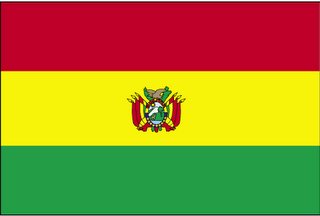While his predecessors readily accepted the economic privatization programs endorsed by the World Bank and International Monetary Fund, President Morales continues to reject the
“Washington Consensus” and drive towards reclaiming Bolivia’s resources.
On May 2 - one year and one day after nationalizing Bolivia’s hydrocarbon sector - 44 renegotiated oil and gas contracts were officially finalized with Morales’ signature. By gaining the 82 percent royalties that multinationals formerly received, hydrocarbon revenue is expected to triple and could bring the poorest South American nation as much as $2 billion in 2007.
Still in dispute under the hydrocarbon initiative is the amount Bolivia will pay for two oil refineries owned by Brazil’s Petrobras. While a book value of $50-60 million has been offered,
Brazil is demanding the market value or about four times the initial offer as negotiations continue.
Morales announced a series of
new government initiatives to be funded by increased oil and gas revenues. Of particular interest is the “Social and Solidarity Housing Program” - designed to provide subsidized loans to low and middle income Bolivians and support the construction of more than 14,000 homes and improvement of 26,000 residences.
In another bold move, Morales further alarmed international capitalists this week by announcing Bolivia will pull out of the International Center for the Settlement of Investment Disputes. An enforcement arm for the World Bank, this international arbitration court is used by multinational corporations and governments to gain compliance from borrower nations.
"No country in the world has ever won in international arbitration. Not the governments, [not] the nations, not the people. Only the companies win," stated Morales. Bechtel used the ICSID to file a
$25 million suit against Bolivia when its subsidiary, Aguas del Tunari, was kicked out of the country in the Cochabamba Water War of 2000.
By pulling out of the ICSID, the Bolivian government should gain more protection over investments that are reclaimed during nationalization, making it more difficult for foreign companies to sue. Last month Morales issued a decree setting a 30-day deadline for Telecom Italia to renegotiate its 50 percent stake in Entel - Bolivia's largest telecommunication company. The Italian company owns a majority share but is accused of tax evasion and failing to honor its contractual obligations. Currently talks between both governments have reached a standstill.
As the South American region makes efforts to further integrate economic resources, Morales expressed belief that other organizations will be more supportive of Bolivia’s economic and development needs.
At this time, Bolivia’s primary lender is the
Andean Development Corporation, (known by its Spanish acronym CAF) which has fewer conditions for its loans. Last year, Morales let Bolivia's line of credit with the IMF expire and is now turning to regional sources for development funding.
On May 3, during a meeting in Quito, Peru – finance ministers from Argentina, Brazil, Bolivia, Ecuador, Paraguay and Venezuela decided to form a new
development bank and regional stabilization fund.
This initiative is on the heels of Venezuela and Argentina’s announcement to launch the new “Banco del Sur” (Bank of the South) with the purpose of financing regional integration projects. Both countries pledged more than $ 1 billion in start-up capital with other founding members - Brazil, Bolivia, Ecuador and Paraguay - contributing between $300 and $500 million a piece.
Efforts to rid his country of Washington’s neoliberal economics may be earning Morales criticism from foreign political and financial interests, but in the short-term, the administration’s initiatives are growing Bolivia’s economy and providing additional funding for social programs. With an approval rating of 64 percent, President Morales remains popular, demonstrating that his mandate to return dignity and liberty to Bolivia, may be well on its way.
*With sources from Reuters, International Herald Tribune, Angus-Reid, BrazzilMag, and Foreign Policy in FocusLabels: banco del sur, Entel, housing, hydrocarbon economic, IMF, loan, washington consensus, World Bank



